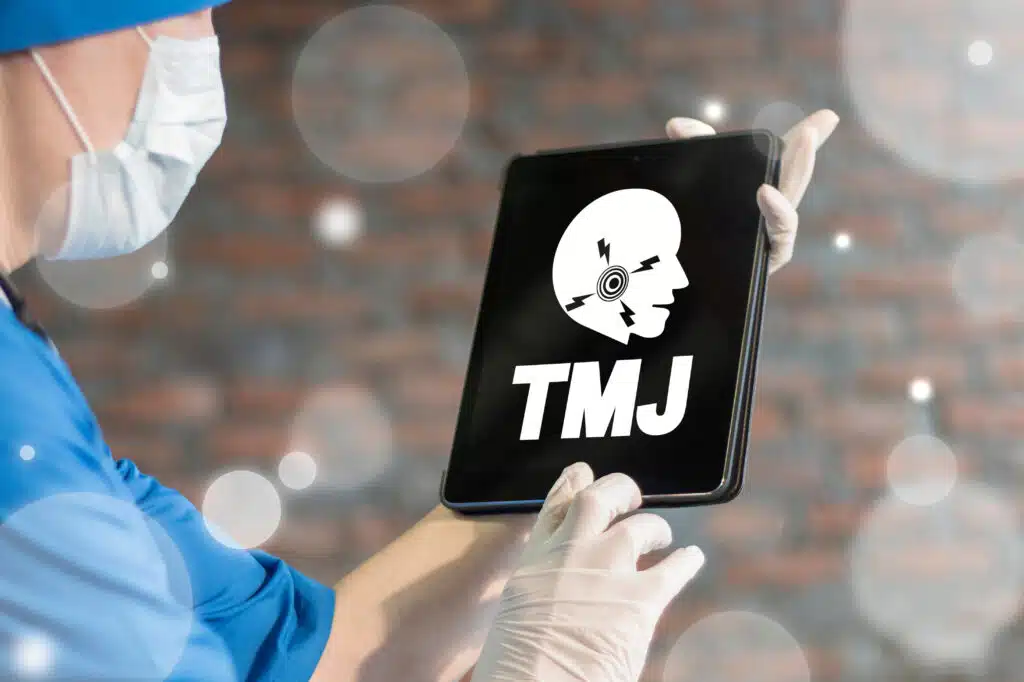Are you experiencing persistent jaw pain, headaches, or even ear pain? It might not be just a random occurrence. It could actually be linked to a condition called Temporomandibular Joint Disorder (TMJD).
When your temporomandibular joint (TMJ or “jaw joint) isn’t functioning properly, it can lead to a range of uncomfortable symptoms. Understanding the warning signs is the best way to treat your issue effectively.
Common Symptoms of TMJ Disorder (TMJD)
Bruxism: Chronic teeth grinding is a common symptom of TMJD. People who grind their teeth during sleep will naturally strain their jaw joints (TMJ).
Headaches or Ear Pain: Frequent headaches or symptoms of ear pain may mimick migraine symptoms. In reality, they could be caused by muscle and joint tension.
Jaw Pain: TMJ discomfort is a hallmark symptom of TMJD. This pain can radiate to the face, neck, and even into the shoulders or back.
Limited Range of Motion: Individuals with TMJD may experience a limited ability to move their jaw, making it difficult to open their mouth fully.
Pain When Biting into Food: Chewing can become painful for those with TMJD, as chewing can put additional stress on the already compromised joint.
Flat, Worn, or Chipped Teeth: Continuous teeth grinding can lead to dental problems such as flat, worn, or chipped teeth. Worn enamel may also “throw off your bite,” causing added strain to your jaw joints.
Sleep Apnea: TMJ disorders can also be linked to sleep apnea, as people with sleeping disorders tend to grind their teeth and experience oxygen deprivation, leading to sore jaws and headaches.
What Are the Symptoms of Bruxism (Teeth Grinding)?
People who grind their teeth on a continual basis typically exhibit signs of:
- Worn, flattened, or chipped enamel
- Broken dental work
- Sensitive teeth
- Pain or discomfort in the jaw, face, or neck
- Earaches or headaches, especially in the morning
- Disrupted sleep patterns
- A clicking or popping sound when opening and closing the jaw
Why Is Teeth Grinding Linked to Sleep Apnea?
If you suspect you have bruxism, it’s important to consult with a dentist or TMJ specialist for a proper diagnosis and treatment plan. Why? Because teeth grinding and sleep apnea are closely related. When your airway becomes partially blocked due to relaxed throat muscles, your body may respond by grinding the teeth as a way to stimulate the muscles. That’s why so many people with untreated sleep apnea also have worn, flat teeth or TMJD symptoms.
What Are the Treatment Options for Sleep Disorders?
If you suspect you have a sleep disorder like sleep apnea, it’s crucial to seek treatment sooner rather than later. Some of the most common apnea treatments in San Diego include the following:
- Continuous Positive Airway Pressure (CPAP) Therapy
- Oral Appliances (Mandibular Advancement Devices)
- Lifestyle Modifications
- Surgery
How Can I Improve My Sleep Quality?
Improving your sleep quality is essential for overall health and well-being. But it can also help you address the underlying cause of TMJD or sleep apnea. Experts recommend that you maintain a consistent sleep schedule, going to bed around the same time every evening and keeping with a routine. Avoid having any lights or electronics in the room, as blue light can disrupt your natural sleep cycle. Additionally, cut down on drinking alcohol or caffeine, which can both alter your sleep patterns. Exercise can also be helpful, but limit harder workouts to the morning hours, rather than later in the day.
Last but not least, if you think you have TMJD or a sleeping disorder, be sure to meet with a specialist about your condition.
Can Dental Appliances Help with Sleep Apnea?
Yes, dental sleep appliances, specifically mandibular advancement devices, can be extremely helpful for people with mild to moderate cases of sleep apnea. These devices work by repositioning the lower jaw and tongue to keep the airway open, and they’re FDA-approved.
In some cases, oral sleep devices can eliminate the need to use a CPAP machine. However, it’s essential to consult with a sleep specialist or trained sleep dentistry provider to determine if a dental appliance is the right treatment for you.
If you’re in the San Diego area and suspect you may have TMJ disorders or sleep apnea, contact SD Sleep Center today. Our experienced team will recommend a personalized treatment for your specific condition. Call us today!


